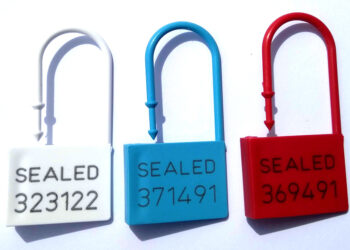ISO 17712: High Security Seals and Their Importance in Supply Chain Security
In the realm of international trade and logistics, maintaining the security and integrity of cargo during transportation has become a paramount concern. The need to safeguard shipments from tampering, theft, and unauthorized access has led to the development of international standards that address these issues. One such standard is ISO 17712, which pertains to high-security seals and plays a crucial role in enhancing supply chain security.
Overview of ISO 17712:
ISO 17712 is an international standard developed by the International Organization for Standardization (ISO) that specifies requirements for the design, testing, and classification of high-security seals used on containers and conveyances in international shipping. These seals are essential components of supply chain security, as they provide a means to detect and deter unauthorized access to cargo.
The standard outlines three main categories of security seals, each with different levels of strength and suitability for various applications:
- Indicative Seals: These seals are designed primarily to show evidence of tampering or unauthorized access. They are generally lower in strength and are easily broken, making them suitable for applications where high security is not a primary concern.
- Security Seals: These seals are more robust and provide a higher level of security. They are designed to resist tampering attempts and unauthorized access, thus offering a greater degree of protection for cargo.
- High Security Seals: This category encompasses the most robust and tamper-resistant seals. They are specifically designed to deter and delay sophisticated tampering attempts, making them crucial for securing high-value or high-risk shipments.
Importance of ISO 17712:
The importance of ISO 17712 in the context of supply chain security cannot be overstated. Here are several key reasons why this standard holds significance:
Tamper Evidence:
ISO 17712-compliant seals provide clear and visible evidence of tampering or attempts at unauthorized access. This allows for quick identification of potential security breaches and enables timely intervention.
Cargo Integrity:
By using high-security seals that meet ISO 17712 requirements, stakeholders in the supply chain can ensure the integrity of their cargo. This is particularly crucial for sensitive, high-value, or hazardous shipments.
Theft Prevention:
The presence of tamper-evident and robust security seals acts as a deterrent against theft. Criminals are less likely to target shipments that are visibly secured with ISO 17712-compliant seals.
Risk Management:
High-security seals help mitigate the risks associated with cargo theft, tampering, and unauthorized access. This is especially important in industries where the loss of goods can have severe financial and reputational implications.
Regulatory Compliance:
Many countries and international organizations have incorporated ISO 17712 requirements into their regulations and guidelines. Adhering to these standards helps businesses comply with legal and regulatory frameworks.
Global Consistency:
ISO 17712 provides a standardized approach to supply chain security that is recognized and accepted globally. This consistency in seal design, testing, and classification ensures that security measures are cohesive across different regions and modes of transportation.
Insurance and Liability:
In the unfortunate event of a security breach, having ISO 17712-compliant seals in place can strengthen insurance claims and limit liability issues. Properly secured shipments demonstrate due diligence in safeguarding cargo.
Customer Confidence:
Maintaining a high level of supply chain security enhances customer trust and confidence. Businesses that prioritize security are more likely to attract and retain clients who value the protection of their goods.
Conclusion:
ISO 17712 plays a pivotal role in enhancing supply chain security by providing a standardized framework for the design, testing, and classification of high-security seals. These seals serve as a critical line of defense against tampering, theft, and unauthorized access to cargo during transportation. By adhering to the requirements outlined in ISO 17712, businesses and stakeholders in the global supply chain can better safeguard their shipments, mitigate risks, and maintain the integrity of their operations.











